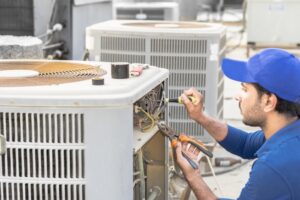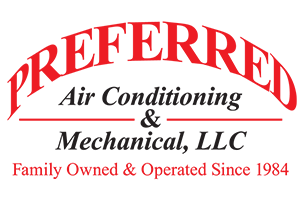How Poor Indoor Air Quality Can Impact Your Household
 The air in your Palm Beach area home could be more polluted than outdoors. Indoor air quality (IAQ) can suffer due to issues such as chemical residue from household cleaners, hazardous vapors from adhesives, paint and other hobby or home improvement projects, mold, pet dander, dust, pollen, insect infestations and more. Even a wet carpet can release harmful particles into your home’s air. Incomplete combustion from poorly maintained HVAC systems and appliances can also allow hazardous gas and other emissions to be released in your indoor air supply. That’s a long list of hazards and there are many more. Why is it so important to improve your home’s indoor air quality? Read on!
The air in your Palm Beach area home could be more polluted than outdoors. Indoor air quality (IAQ) can suffer due to issues such as chemical residue from household cleaners, hazardous vapors from adhesives, paint and other hobby or home improvement projects, mold, pet dander, dust, pollen, insect infestations and more. Even a wet carpet can release harmful particles into your home’s air. Incomplete combustion from poorly maintained HVAC systems and appliances can also allow hazardous gas and other emissions to be released in your indoor air supply. That’s a long list of hazards and there are many more. Why is it so important to improve your home’s indoor air quality? Read on!
Poor Indoor Air Quality: What Harm Can It Do?
Sometimes, your home’s air just isn’t healthy for you, your family or your budget. Contaminants that contribute to poor indoor air quality can cause more problems than you might think. Here’s a look at some of the consequences of indoor air pollution:
- Breathing problems: If you or a family member suffers from allergies, asthma or lung ailments, poor indoor air quality can make these conditions worse. Airborne contaminants can cause allergy flare-ups and asthma attacks. If you have kids or seniors in your home, they are the most vulnerable. Watery or itchy eyes and an irritated throat can make you feel consistently miserable – and your home’s air can be causing these symptoms. Taking steps to improve in-home air quality can help you breathe a lot easier.
- HVAC system breakdowns and excess equipment wear: Dust and other particles in the air also get into your air conditioning and heating system, damaging the equipment and making it old before its time. It’s important that your cooling and heating systems are regularly inspected, tuned up and cleaned to protect the money you’ve invested in them. Who wants to replace their HVAC system years earlier than they should? Who wants to deal with frequent, costly and inconvenient repairs? It goes both ways – cleaner air keeps your home-comfort system in great shape, and keeping it in shape helps improve your air quality.
- Repeated or long-term illness: When your home’s air contains excessive pollution from dirt, debris, mold and/or mildew, this can make your family more prone to sickness. Many symptoms such as frequent headaches, major fatigue and loss of the ability to concentrate can be brought on by poor indoor air quality. When one person gets ill in this environment, the cold or flu could pass from one family member to the other in an almost never-ending cycle due to airborne bacteria. Some chemical emissions in the air can contribute to health problems that may not show up until many years later. Why take chances with your family’s health?
- High utility bills and energy waste: When indoor air, ductwork and HVAC systems need cleaning, your equipment works harder to cool or heat your home. If your energy bills are going nowhere but up, it might not be due to rates increasing. When you invest in regular HVAC maintenance, you’ll get improved performance and efficiency from cooling and heating systems – and lower energy bills.
Steps to Improve Your Indoor Air Quality
- Increase ventilation in your house: Your home needs to be well insulated and sealed for energy efficiency, but that same air tightness can trap pollutants indoors. Opening windows when the air conditioner is on doesn’t help keep energy bills in check – so what can you do? Your HVAC technician can check your home’s airflow and suggest repairs or upgrades to increase ventilation if necessary.
- Turn on the A/C: Make sure your air conditioner has dehumidification and air cleaning built in. An integrated cooling, air cleaning and humidity control system is essential here in South Florida. Controlling your home’s humidity will make you feel cooler so you can raise the thermostat and save energy. In addition, drier air means less opportunity for mold growth, and the air cleaner will help keep your IAQ consistently high.
- Install a high-efficiency air filter: Make the air conditioner even more efficient and effective by using (and replacing often) a high quality air filter. You’ll also protect the equipment from dust to prolong its useful life. Your HVAC contractor can recommend a high quality filter that is compatible with your air conditioning system.
Wondering about poor indoor air quality? Contact Preferred Air Conditioning & Mechanical, LLC, for air quality testing, HVAC maintenance, advice about filter quality, dehumidifiers, duct cleaning and more. We provide superior services to Palm Beach Gardens, Palm Beach, Lake Worth, Wellington, Port St. Lucie and Delray.
Image Provided by Shutterstock.com
You May Also Like

Boost Your Boca Raton, FL, Business With Commercial AC Repair
Florida’s subtropical climate doesn’t take a February vacation. While temperatures hover in the comfortable mid-70s, your commercial AC system works overtime maintaining… Continue Reading Boost Your Boca Raton, FL, Business With Commercial AC Repair…

Beat the Chill With a Lower Heating Bill in Vero Beach, FL
While our Florida chill might not compare to northern freezes, the recent cold fronts have homeowners reaching for their thermostats with increasing… Continue Reading Beat the Chill With a Lower Heating Bill in Vero Beach, FL…

Yes, You Must Schedule Heating Maintenance in Fort Pierce, FL
The salty ocean breeze that makes Fort Pierce, FL, living so appealing carries an invisible threat to your heating system. December’s mild… Continue Reading Yes, You Must Schedule Heating Maintenance in Fort Pierce, FL…
